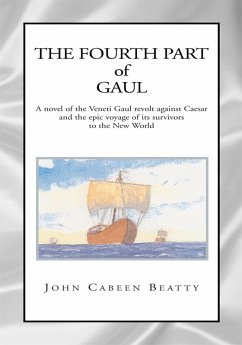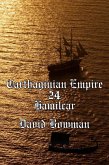In 58 B. C. Rome was the superpower of the Mediterranean world, and in that year Julius Caesar took up the governorship of the Roman Province in southern France or Gaul, as it was then called. The Roman Senate expected Caesar to govern the province, extract a reasonable amount of revenue, and guard the frontier against incursion by the many Gaulish tribes to the north.
Caesar had something else in mind -- the conquest of all Gaul. Within two years he deftly employed his legions to inflict a series of catastrophic defeats upon the Gauls and occupied the eastern half of the country. He then put his troops into winter quarters, sending a single legion under its commander, Publius Crassus, west into Brittany with orders to take hostages to keep the peace. Crassus took the hostages but could not keep the peace. The fiercely independent tribes led by the Veneti bitterly resented giving hostages to Rome. At their first opportunity they seized Roman officers as hostages, then demanded return of their own hostages in exchange. When Publius Crassus rejected their demands, the Gauls revolted.
The Fourth Part of Gaul is the story of that revolt as experienced by Marcus Brutus Pontus, a young tribune and staff officer, one of the hostages taken by the Gauls. His captors place the inquisitive young officer in the hands of a Veneti magistrate for safekeeping. This assignment insures him a unique position from which to view the spread of the insurrection and the huge naval battle between the Gaulish sailing fleet and Caesar's Roman galleys. Marcus narrowly escapes death during the catastrophic defeat of the Gauls.
In the aftermath of the battle, many Gauls fleeing Caesar's wrath sail for Britain, while a small party of five ships crammed with families and soldiers sails west on the Atlantic. Led by a Greek pilot, they follow a long forgotten Carthaginian trade route taking with them their captive tribune. In the course of the long voyage, Marcus learns to navigate and handle the ship. His developing relationship with the sister of the expedition's leader involves him increasingly in the struggle of the expedition to survive the frigid winter and treacherous attack on their settlement at the mouth of the Connecticut River.
By spring the Gaulish leaders come to see their Roman hostage as the essential key to their survival in the hostile environment of the new land. They themselves have become uniquely dependent on the hostage they have taken.
Caesar had something else in mind -- the conquest of all Gaul. Within two years he deftly employed his legions to inflict a series of catastrophic defeats upon the Gauls and occupied the eastern half of the country. He then put his troops into winter quarters, sending a single legion under its commander, Publius Crassus, west into Brittany with orders to take hostages to keep the peace. Crassus took the hostages but could not keep the peace. The fiercely independent tribes led by the Veneti bitterly resented giving hostages to Rome. At their first opportunity they seized Roman officers as hostages, then demanded return of their own hostages in exchange. When Publius Crassus rejected their demands, the Gauls revolted.
The Fourth Part of Gaul is the story of that revolt as experienced by Marcus Brutus Pontus, a young tribune and staff officer, one of the hostages taken by the Gauls. His captors place the inquisitive young officer in the hands of a Veneti magistrate for safekeeping. This assignment insures him a unique position from which to view the spread of the insurrection and the huge naval battle between the Gaulish sailing fleet and Caesar's Roman galleys. Marcus narrowly escapes death during the catastrophic defeat of the Gauls.
In the aftermath of the battle, many Gauls fleeing Caesar's wrath sail for Britain, while a small party of five ships crammed with families and soldiers sails west on the Atlantic. Led by a Greek pilot, they follow a long forgotten Carthaginian trade route taking with them their captive tribune. In the course of the long voyage, Marcus learns to navigate and handle the ship. His developing relationship with the sister of the expedition's leader involves him increasingly in the struggle of the expedition to survive the frigid winter and treacherous attack on their settlement at the mouth of the Connecticut River.
By spring the Gaulish leaders come to see their Roman hostage as the essential key to their survival in the hostile environment of the new land. They themselves have become uniquely dependent on the hostage they have taken.
Dieser Download kann aus rechtlichen Gründen nur mit Rechnungsadresse in A, D ausgeliefert werden.









